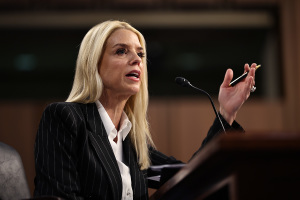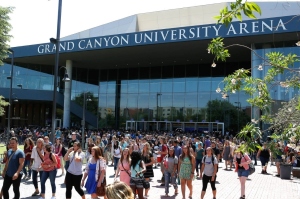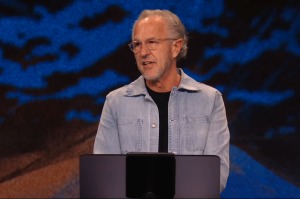Faith Groups Build Giant Ark on National Mall
WASHINGTON – A diverse group of religious people unveiled a giant ark on the National Mall Saturday to press world leaders in Copenhagen to create a strong, binding proposal to tackle climate change.
Organizers say the 19-foot-high ark is a warning that if world leaders do not come up with a strong plan to deal with the climate change problem, then the ark might very well be how individuals will have to live in the future.
"While a 'Real Deal' is 'Climate Plan A,' the ark depicts 'Climate Plan B' and the lack of current options for a fair, ambitious, and binding deal coming out of Copenhagen," reported Avaaz.org and Faithful America, the two groups that organized Saturday's vigil.
Speakers at the unveiling spoke about how their religious communities are helping to raise awareness about the climate change issue and how rising sea levels are forcing thousands of island dwellers to abandon their home and become refugees.
"We have no more time," said Kim Huynh, who emphasized that the Polynesian island nation of Tuvalu on which she was born is at risk of be submerged under rising sea levels. The tiny Pacific island nation has already seen parts of its coastline disappear under the ocean, forcing some of its citizens to become climate refugees.
"How will President Obama deal with the [climate] refugee crisis?" Huynh asked as she called for U.S. lawmakers to support binding cuts in greenhouse gas emissions and help finance climate adaptation for developing countries.
The Rev. Derrick Harkins of Nineteenth Street Baptist Church in Washington, meanwhile, said people of faith – both liberal and conservative – believe that creation is a gift from the creator. The Bible, Harkins said, tells believers that God blesses mankind with the creation but that we also need to be good stewards of the gift.
"We are on the brink of crisis," Harkins said, emphasizing what the ark represents. "Millions of people are already victims of climate change."
Following Harkins' remarks, people wrote on the ark a message of what they hope will come out of the climate talks in Copenhagen, where national government delegations who agreed to shape an ambitious international response to climate change in 2007 have been meeting to agree on a post-2012 climate agreement that will replace the current Kyoto Protocol.
Afterwards, people gathered in front of the ark for a candlelight vigil.
The ark event in D.C. was one of some 3,000 simultaneous candlelight vigils in over 130 countries calling for a "real deal" in Copenhagen.
In the city hosting the climate talk, religious leaders also gathered for a candlelight vigil Saturday evening.
Nobel laureate Archbishop Desmond Tutu said at the Copenhagen vigil, "We have just one world and we want to live in a beautiful world."
The next day, Sunday, Tutu handed over to Yvo de Boer, executive secretary of the U.N. Framework Convention on Climate Change, over half a million signatures for climate justice. The signatures were collected by the Countdown to Copenhagen campaign, a coalition of ecumenical development and humanitarian aid organizations.
"For the sake of your children, of your grandchildren, care for this one world we have… Let us have a legally enforceable deal, not a political deal," said Tutu at a media conference Sunday.
Tutu and other religious leaders called for an agreement in which developed nations commit to reducing their 1990 carbon dioxide emission levels by 40 percent by 2020 and by 80 percent by 2050. Developed countries should also contribute $150 billion per year to assist developing nations to reduce their carbon emissions and adapt to the consequences of climate change, they urged.
But not everyone at the Copenhagen conference agrees that a binding proposal limiting carbon emissions is urgently needed. Some people believe that while humans are mostly to blame for climate change, the effects are not as devastating as mainstream scientists claim. Rather, the global warming witnessed could be caused naturally by changes such as alternations in the Earth's orbit and solar energy and solar wind output.
Some scientists even claim that increased carbon dioxide in the atmosphere is not having a negative effect on the earth.
Despite ongoing debate over the existence and cause of global warming, the Christian community largely agrees that people have a responsibility to care for God's creation and, even in America, there is more support than opposition for a policy to set limits on carbon emissions.
According to the Pew Research Center, 57 percent of Americans said that there is solid evidence that global temperatures are rising while 33 percent said they don't believe that there is solid evidence.
And while only 56 percent of global warming believers say humans are to blame for climate change, half of Americans overall favor setting limits on carbon emissions and making companies pay for their emissions, even if this may lead to higher energy prices. Thirty-nine percent, meanwhile, oppose imposing limits on carbon emissions under these circumstances.
The U.N. climate conference, which has drawn participants from 192 countries representing governments, the business community, and civil society, began on Dec. 7 and will end this Friday.
Approximately 15,000 are taking part in the summit.





























